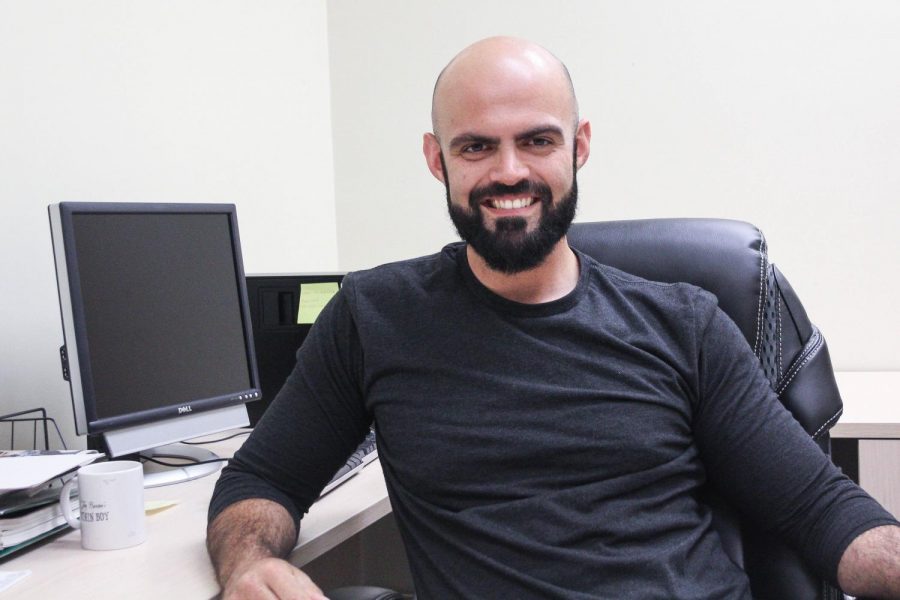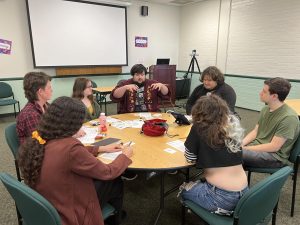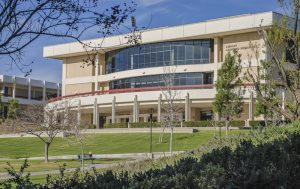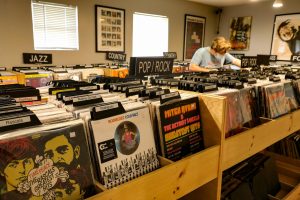The chilling effect of Trump’s Muslim ban
Hamza Saleh is the current President for the Muslim Student Association. His goals are to bring knowledge to not only his own community but any community looking to know the truth about being a Muslim American. Photo credit: Eric Caldwell
April 27, 2017
Some may view the controversy over the Muslim ban as something far removed from their everyday experience. However, consider those who may be directly affected by this executive order. The impact on our fellow Muslim students are real, immediate and troubling.
Moorpark student and President of the Muslim Students Association, Hamza Saleh shares his perspective of being a Muslim American during these hectic times.
“I feel like a second class citizen in the only place I can call home. But now we have a demagogue in office who is playing on people’s fears and it’s like overnight everything has changed. We are being collectively punished over the media-blasted actions of a few that my global Muslim community has condemned,” said Saleh. “I’m lucky to be an American citizen, but I have friends who are students, or married to American women and have kids, but can’t go see their families, or their dying parents in the Middle East over fears of not being able to come back home to the US.”
Saleh also noted that banning Syrian refugees would not help but worsen the situation for those trying to escape the bloodshed of a war torn country in the midst of a civil war and government unrest.
“As far as [pertaining to Syrian] refugees, we are not dealing with politicians in the Middle East we deal with tyrannical rulers, look at Egypt and Syria,” said Saleh. “We responded to freedom..and democracy, and to see it could all be taken by one guy [Trump], it’s not the values America preaches.”
President Donald Trump has used his executive powers to try to ban immigrants and visa holders from seven Muslim majority countries. Those countries initially included Iraq, Iran, Libya, Somalia, Sudan, Syria, or Yemen. Oddly enough Saudi Arabia a key US ally was left off the list. Despite, the fact that some of the Al-Quade terrorist responsible for 9/11 were Saudi Arabian.
“All the countries in the ban are too poor to do business with Trump, look at Somalia, Sudan and Yemen,” said Saleh. “Follow the money, these countries are not oil rich like Saudi Arabia.”
Trump has said he did this in an attempt to stop terrorist from entering the United States. However, the ban has been blocked twice now as US judges have ruled the order unconstitutional to first amendment rights.
Even with the ban being blocked for now, Saleh still feels the stigma left behind. Like many Muslims, Saleh has experienced the irrationality of others who choose hate over solidarity when presented with cultural diversity, in particular, Saleh’s thick black beard and olive skin. Whether it’s a dirty look or racial slur, Saleh wants others to know that he chooses not to engage but rather just gives a smile back.
Saleh believes the agenda of media and television plays a huge role in how many different cultures and ethnic populations view one another. If someone does not have a lot of knowledge and insight on another culture then it could be easier to believe stereotypes that misrepresent people.
“When I was younger, unfortunately, I also fell into the media mindtrap,” said Saleh. “I thought Black people wanted to kill me, and Mexican people sold drugs. I didn’t question [it] nor did my parents. Now that the media is demonizing the Muslim community I realize the tactics of the fear factory and how I was wrong and playing into it. If only I had thought outside the box in the corner of the living room.”
Trump uses the threat of terrorism to target a specific religious group. Under the first amendment however, freedom of religion is provided to all citizens. So why are Muslim Americans now being restricted when the vast majority of them do not share anywhere near the same values as the extremists?
“Do you really think if Bin Laden and ISIS represented Islamic values and ideologies that I would follow this religion?” questioned Saleh, adding that he wasn’t just born to Muslim parents, but also independently chose the religion for himself.
“I’m a rational human being just like you. If the media was telling the truth, my innate power of reason and self respect wouldn’t allow me to continue with my soul-scription,” said Saleh. “ I feel betrayed by the media for their portrayal of Islam, just as I imagine all of their other victims did, like the Hispanic/Latino communities, the Blacks, the LGBTQs, the supposedly blood-thirsty racist officers who risk their lives everyday for us without a single thank-you. You should feel betrayed, too.”
To make assumptions on a whole group of people based off the actions of a few is unfair. When we look at a man like Timothy Mcveigh, who was an American terrorist and extremist known for the Oklahoma City bombing on April 19, 1995, we label him as sick and disturbed and not a replication of American ideals. That is why it seems unethical to ban a whole group of people and associate them in a incident that does not reflect their ideologies.
In times of crisis there is a tendency to strike out at those we view as different but our actions must not overreach the crisis. We must take into account the carefully crafted and thoughtful ideals in the Constitution and Bill of Rights. We must separate religion from policy.
“In times like this I can’t fall into pressures to accept the growing taboo surrounding my spiritual identity,” said Saleh. “I’ll challenge that narrative and engage the community around me, as a friend and a brother I want others to know I’m just like them, a rationalizing human with a beating heart.”








